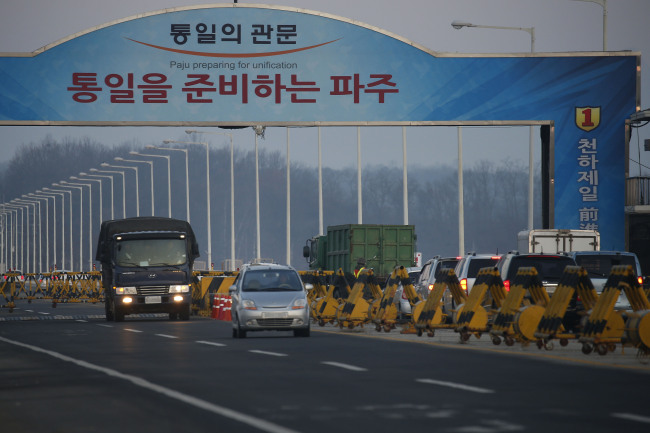South Korea and the U.S. are spurring global efforts to slap a fresh batch of crippling sanctions on North Korea following the communist nation’s fourth atomic experiment, ratcheting up pressure to extract China’s endorsement while crafting separate punishments at home and with close partners.
 |
| Vehicles wait to cross the border to enter the Gaeseong industrial park in North Korea on Monday. (Yonhap) |
Seoul and Washington pledged to have Pyongyang face “consequences” for breaching international bans to press ahead with the underground explosion last Wednesday. As the South restarted anti-North propaganda broadcasts across the Demilitarized Zone, the U.S. flew a nuclear-capable strategic bomber in a show of force and is drafting a new U.N. Security Council resolution and working on bilateral sanctions through its congress.
Their core task is to induce Beijing to agree to a substantial economic squeeze on the Kim Jong-un regime, given China’s decades-old patronage of North Korea that has long been pointed to as a major impediment to the UNSC sanctions’ enforcement.
“What we’ll continue to do is work not just with South Korea and Japan but also with China and Russia to deeply isolate the North Koreans,” White House Chief of Staff Denis McDonough said in an interview with CNN, released Sunday, Washington time.
“We’re going to have to continue to squeeze the North Koreans until they live up to their prior commitments, including going back to 2005, when they committed to be rid of their nuclear weapons. That’s the baseline requirement they have to rejoin the international community.”
Citing Chinese President Xi Jinping’s reiteration last September in Washington of the country’s commitment to a nuclear weapons-free peninsula, McDonough indicated that the Barack Obama administration will pile pressure on Beijing to follow through on its earlier statements.
“We take them at their word and we’ll continue to work with them and make sure that they understand that a nuclear North Korea is not a stable scenario. And so they have to understand that,” he added.
Seoul’s Foreign Minister Yun Byung-se has also stressed China’s role in the North Korean nuclear issue, saying it is time to put its words to action before the world.
“The Chinese government should implement the promises it has made to the international community this time, during the UNSC’s resolution approval process,” the top diplomat said Sunday on KBS.
“It will contribute to the peace and stability on the peninsula and in Northeast Asia and the globe, plus it has its own significance as China’s own pledges. Then (the international community) would not think of it as hollow words.”
With its veto power at the council and formidable influence over the Kim dynasty, Beijing has long been resistant to imposing much more powerful banking restrictions or “secondary boycott” steps, which call for penalties for third-party companies and individuals engaging in transactions with the North. However, it did somewhat tighten the existing measures’ implementation.
After an apparently angry initial response to the uninformed atomic blast, China’s Foreign Ministry called for restraints by “relevant parties” to prevent a further flare-up in tensions.
“We hope that relevant parties can exercise restraint, take prudent actions and avoid ratcheting up tensions,” ministry spokesperson Hong Lei told reporters Monday when asked about the B-52 flight and South Korea’s resumption of the propaganda broadcasts.
Washington is reportedly writing a draft resolution proposal for the UNSC that would stifle North Korean trade and finance through a partial ban on its ships seeking to enter ports around the world and a cutoff of banking transactions similar to the ones previously levied against Iran.
The U.S. House is also expected to vote on legislation containing new sanctions on the North this week.
Tokyo, for its part, is mulling reviving unilateral bans, such as on money transfers from and people-to-people exchanges with the communist country, which were lifted in July 2014 in return for Pyongyang’s launch of a probe into its abduction of Japanese citizens in the 1970s and ’80s.
As part of efforts to boost pressure, the vice foreign ministers of South Korea, the U.S. and Japan are expected to gather in Tokyo later in the week to coordinate their response.
Hwang Joon-kook, South Korea’s representative to the stalled six-party denuclearization forum, plans to meet here Wednesday with his U.S. and Japanese counterparts, followed by a two-way meeting the next day with China’s chief nuclear negotiator Wu Dawei in Beijing, Seoul’s Foreign Ministry said later in the day, adding that it is arranging separate talks between Hwang and his Russian counterpart.
President Park Geun-hye and Obama are scheduled to respectively give televised speeches on Wednesday and Thursday, Seoul time, during which they will likely deliver stern messages against Pyongyang’s unrelenting nuclear ambitions and rally the international community to press the unruly regime.
By Shin Hyon-hee (heeshin@heraldcorp.com)

